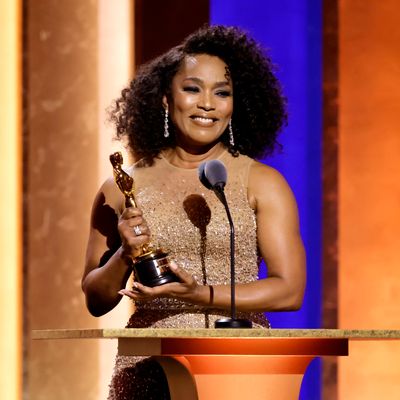
The Oscars is finally giving Angela Bassett her long overdue flowers.
During Tuesday night’s Governors Awards, which is hosted by the Academy of Motion Picture Arts and Sciences, Bassett received an Honorary Oscar for her continued achievements in the film industry throughout her decadeslong career. Though the prolific actress had previously earned two Oscar nominations — one Best Actress nod for the role of Tina Turner in the 1993 biopic What’s Love Got to Do With It and a Best Supporting Actress nomination for her turn as Queen Ramonda in the 2022 film Black Panther: Wakanda Forever — she had never brought home the gold.
On Tuesday, the 65-year-old Bassett delivered a stunning acceptance speech, paying tribute to some of the “trailblazing” Black actors who paved the way for her success, naming Ruby Dee, Diahann Carroll, Cicely Tyson, and Rosalind Cash, among others.
“It was standing on their strong, spiritually fortified shoulders that I often was sustained, and I thank them for every sacrifice, every doubt, every disappointment, every rejection, every triumph that I know they experienced along the way,” Bassett said. “Because had it not been for their resilience, continuing to fight through their fears and the uncertainty and their willingness as they fought for every role, I would not have had a representation of what was possible for me.”
Though the award is surely welcome validation, the Academy has ignored Bassett on far too many occasions. Despite winning the 2023 Golden Globe for her portrayal of Queen Ramonda in Black Panther: Wakanda Forever, the Academy snubbed Bassett in the Best Supporting Actress category, ultimately awarding the Oscar to Jamie Lee Curtis. Bassett, who had been a seasonlong favorite, was visibly disappointed during the ceremony, as is her right: Awards shows and their voting committees have historically given preference to white actors. Rather than a properly timed celebration of one of the greatest actresses working today, this award feels like a belated apology.
Bassett highlighted systemic racial disparities in her acceptance speech, noting that Halle Berry is still the only Black woman to have won a Best Actress Oscar. She then used her time onstage to uplift and encourage fellow Black actors, shouting out Jennifer Hudson, Regina King, Viola Davis, Mo’Nique, Lupita Nyong’o, Octavia Spencer, and Ariana DeBose. “Remember who you are and who our ancestors intended you to be — us to be,” she said.
“But this honor isn’t just for or about me. What I hope this moment means is that we are taking the necessary steps toward a future in which it is the norm, not the exception, to see and embrace one another’s full humanity, stories, and perspectives,” Bassett went on. “This must be our goal, and to always remember that there is room for us all. When we stand together, we win together.”
Moving forward, let’s hope the Academy recognizes Bassett’s tour de force performances right on time and not a second later.


